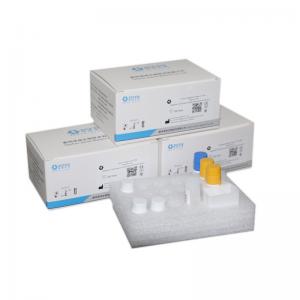
Add to Cart
Prostate Cancer Indicators Prostate Acid Phosphatase(PACP) test kit Tumor Maker Assay for Clinical In Vitro Diagnostic
Clinical Significance
Prostatic acid phosphatase (PAP) is a glycoprotein (molecular weight 100,000) synthesized and secreted by mature prostate epithelial cells. It enters the seminal vesicle through the prostate duct and is excreted from the urethra. In prostate cancer, the prostatic acid phosphatase produced by cancer cells is directly absorbed into the blood circulation because there are no ducts or the gland ducts are destroyed by the cancer cells, resulting in an increase in serum prostatic acid phosphatase.
Abnormal results: This method can be used for the diagnosis, treatment effect and prognosis evaluation of prostate cancer and differential diagnosis of metastatic bone tumors. It has been reported that 80% of prostate cancer patients with bone metastases have elevated prostatic acid phosphatase. Serum prostatic acid phosphatase can be elevated in some patients with benign prostatic hyperplasia, and clinical judgment and follow-up observation should be made at this time. The recent digital rectal examination of the prostate can cause an increase in serum prostatic acid phosphatase, so it is appropriate to collect blood before the examination or 2 weeks after the examination. Specimens should not be hemolyzed, otherwise the measurement results may be abnormal. People who need to be checked: People with symptoms such as frequent urination, urgency, urinary retention, dysuria, difficulty in forming urine flow, hematuria, and bone pain.
Related diseases
Prostate cancer, gastrointestinal cancer, prostatitis in the elderly
CLIA Reagents of Tumor Maker(PACP)
| Test Item | PACP |
| Luminescent Principle | Enzymatic chemiluminescence |
| Luminescent Markers | AP(alkaline phosphatase) |
| Specification | 100 Test/Kit for CIA series |
| Principle | Sandwich method |
| Component | Magnetic Beads |
| Calibrator Low | |
| Calibrator High | |
| Anti-A/Anti-B | |
| Control 1 | |
| Control 2 | |
| Accessories Required But Not Provided | Substrate |
| Washing solution | |
| Sample material | Serum/Plasma/Whole Blood |
| Storage | 2-8℃ |


